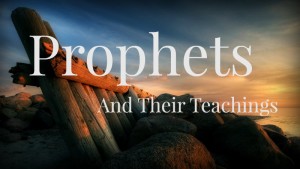We all know that life is hard. There are times when no matter how hard we try, it feels like life itself is seeking to crush us into the dirt. Yet 2 Nephi 2:25 says that “men are that they might have joy.” So when does the joy begin? Perhaps our definition of joy needs to be examined. This is a two-part article. In part one we will look at whether we really do deserve joy in this life. In part two we will look at what it takes to gain the happiness God designed for us to achieve.
Define Joy
 In worldly terms joy is displayed as living in an elated state of euphoria, an extreme state of happiness. The happiness referred to here is the thrill of a boatload of money, of living without worries or commitments that bind us down, having the freedom to come and go as we please. It includes such things as having things work out to our advantage, instead of everything going wrong all the time. It would include being able to pay our bills without the worry that there are bills going unpaid at the same time or that if we pay our bills today we won’t be able to pay them next time.
In worldly terms joy is displayed as living in an elated state of euphoria, an extreme state of happiness. The happiness referred to here is the thrill of a boatload of money, of living without worries or commitments that bind us down, having the freedom to come and go as we please. It includes such things as having things work out to our advantage, instead of everything going wrong all the time. It would include being able to pay our bills without the worry that there are bills going unpaid at the same time or that if we pay our bills today we won’t be able to pay them next time.
Joy in this world seems rather like the life fairy tales offer us. We look at the life of the wealthy or famous, who seem to do as they please, live lavish lifestyles, and are able to send their children to all the right schools and are employed in all the right places.
Worldly joy might also include those who live quiet, peaceful lives of comfort, surrounded by their family members, living in good neighborhoods, with beautiful, manicured lawns and gardens. These people seem safe from the cares of this world. Money tends to give that impression.
All these examples seem to focus around the absence of struggle, and the abundance of resources in one’s life. They highlight lives of carefree existence, and easy decisions. How many times have you or someone you know said, half under their breath, “How would it be?” referring to the lifestyle of someone of means and influence? Sometimes we sit in envious daydreams contemplating what life would be like without all the hardships we seem to have to navigate almost daily.
According to http://dictionary.reference.com, joy has four main definitions:
- the emotion of great delight or happiness caused by something exceptionally good or satisfying; keen pleasure; elation:
- a source or cause of keen pleasure or delight; something or someone greatly valued or appreciated:
- the expression or display of glad feeling; festive gaiety.
- a state of happiness or felicity.
I have taken the liberty of adding italics to the list of definitions. The descriptions of earthly joy in the preceding paragraphs follow a very shallow description of these underlined definitions. These definitions accurately apply to the term joy, but I think we can do better than that. Let’s look at a different way to look at the definition of joy.
Redefining joy
Let’s look at that verse in 2 Nephi 2:25 again.
25 Adam fell that men might be; and men are, that they might have joy.
 The wording of this verse is interesting. “Adam fell that men might be” means (to me) that the reason for Adam’s fall was to bring about the creation of mankind, the human race. The word “that” refers to “the reason for.”
The wording of this verse is interesting. “Adam fell that men might be” means (to me) that the reason for Adam’s fall was to bring about the creation of mankind, the human race. The word “that” refers to “the reason for.”
If we use that same line of thinking for the second half of the verse, then “men are, that they might have joy” means that we were created for the purpose of experiencing joy. But our lives are so often anything but joyful, at least as we currently define a joyful life.
Is there any evidence in the scriptures that our Father in Heaven really does want us to be supremely happy? If there is, then perhaps there are good reasons for the hardships of mortal life. Let’s look at a few verses that talk about God’s intentions for His children.
- We’ve already looked at 2 Nephi 2:25 that says the Lord created us to have joy.
- In Job 38:7 Job is being asked by the Lord where Job was “When the morning stars sang together, and all the sons of God shouted for joy?” This was in the pre-earth life. This does not address the issue of joy in this life, but we certainly know that at least once we all experienced joy in our pre-earth life.
- What we normally call the plan of salvation, Alma the Younger referred to (Alma 42:8) as the great plan of happiness. “Now behold, it was not expedient that man should be reclaimed from this temporal death, for that would destroy the great plan of happiness.” What? The whole purpose of life is for us to be happy? That is what it sounds like he is saying.
- In Moses 1:39 the Lord gives His own reason for being, the purpose for which He “gets up every morning.” (That’s my description. It’s not in the scriptures.) He says, “For behold, this is my work and my glory—to bring to pass the immortality and eternal life of man.” Now, so that you will believe that eternal life is supposed to be one of joy and rejoicing, I give you John 4:36: “And he that reapeth receiveth wages, and gathereth fruit unto life eternal: that both he that soweth and he that reapeth may rejoice together.”
These are just four or five scriptures that show the purpose of earth life. We are supposed to be happy. We are supposed to find joy here. No fullness of joy will be had here, but the Lord certainly intends for us to have access to the beginnings of the eternal joy He has planned for us while we are still here. This is why we were given commandments.
It is the nature of any commandment to produce happiness. Go back and look at some of the alternate definitions of joy. The definitions include being in a state of happiness, and to have something greatly valued or appreciated.
The defining Choice
 It seems odd that we are not usually taught that the amount of joy we experience in this life is largely within our control. Samuel the Lamanite (Helaman 14:31) taught that we are the ones who choose whether we have good or evil restored to us at judgment.
It seems odd that we are not usually taught that the amount of joy we experience in this life is largely within our control. Samuel the Lamanite (Helaman 14:31) taught that we are the ones who choose whether we have good or evil restored to us at judgment.
31. He hath given unto you that ye might know good from evil, and he hath given unto you that ye might choose life or death; and ye can do good and be restored unto that which is good, or have that which is good restored unto you; or ye can do evil, and have that which is evil restored unto you.
In Jacob 10:23 Jacob puts the issue bluntly by saying, “Therefore, cheer up your hearts, and remember that ye are free to act for yourselves—to choose the way of everlasting death or the way of eternal life.” Jacob wasn’t one to sugar coat things. This life is a choice between everlasting death (damnation or a stop in our eternal progression) or eternal life, the opportunity to return to live with God and become like Him.
The important thing to remember is that happiness isn’t withheld until judgment day. Happiness begins to enter our lives as soon as we choose to obey the commandments that create happiness. All commandments create happiness. That is their function and purpose. The Lord says over and over again in the scriptures that eternal life is the greatest gift He can give us. It is the kind of life that God Himself lives. The more we live and keep the commandments the more of that kind of life we experience for ourselves.
Final Thoughts
There are plenty of places in the scriptures and in the teachings of the modern prophets that tell us we are meant to experience joy, and a great deal of it. The Lord has been abundantly clear that misery is not supposed to be our permanent lot in life.
All the commandments lead to happiness in one way or another. All the promptings and teachings of the Spirit bring peace and contentment to our soul. Happiness is part and parcel with living a god-like life. The Lord wants us to have it, to experience it, to enjoy it.
Next week we will look at the challenges of find the joy the Lord wants us to experience. Life sometimes gets in the way of our pursuit of happiness. So how do we find joy in tough times? Come back next week and we will explore some scriptures together that will show you how to find joy, even in adversity.
About Kelly P. Merrill
Kelly Merrill is semi retired and writes for https://gospelstudy.us. He lives with his wife in Idaho. His strength is being able to take difficult to understand subjects and break them down into understandable parts. He delights in writing about the gospel of Christ. Writing about the gospel is his personal missionary work to the members of the Church and to those of other faiths who are wanting to know more about Christ's gospel and His Church.








Having read the talk of joy has helped me to further understand what joy is and can do to increase the joy I can receive while I am still alive on this earth.
So glad you enjoyed it! Thanks, William!
Thank you I need support because I not find with members